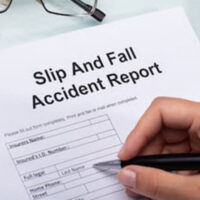Can I Sue My Landlord for a Slip-and-Fall Accident in My Own House?

As a general rule, Tennessee law does not permit the tenant of a property to sue the landlord for injuries sustained on the lease premises. In other words, if you get into a slip-and-fall accident in your own house, you cannot bring a personal injury claim against the landlord. There are, of course, several exceptions to this rule.
One exception allows for a personal injury claim if the tenant can meet all three of the following conditions:
- The “dangerous condition” that caused the tenant’s accident was “in existence” when the lease was signed;
- The landlord had actual or constructive knowledge of the dangerous condition–i.e., they “knew or should have known” there was a hazard that might cause injury to the tenant; and
- The tenant did not know about the dangerous condition, or could not have “learned about it through the exercise of reasonable care.”
Court: No Evidence Townhouse Owners Knew About Stair Problem Prior to Tenant’s Slip and Fall
It is important to understand the burden is on the tenant, in filing a personal injury claim, to show that all three conditions of the exception have been met. The landlord need not “prove” anything.
A recent decision from the Tennessee Court of Appeals, Fisher v. Villages at Henley Station, LLC, provides an effective illustration of this point. The plaintiff in this case rented a townhouse from the defendants. One day, the plaintiff tripped and fell over a loose wood plank located at the top of the steps in his townhouse. The plaintiff subsequently sued the defendants–the owner and property manager of the townhouse complex–alleging they knew, or should have known, about the loose wood.
Before the trial court, the defense submitted an affidavit from the property manager. She explained that the plaintiff was the first person to rent this particular townhouse, which had been completed several months earlier. Prior to signing the lease, the plaintiff and the property manager “conducted a walkthrough of the townhouse, and neither of them observed any damage to or defective condition of the stairs.” The manager insisted neither she nor any other employee of the defendants knew of any issue with the stairs prior to the plaintiff’s accident.
The trial court ultimately determined the plaintiff could not satisfy any of the three conditions described above and granted summary judgment to the defense. First, there was no evidence the “dangerous condition” existed when the plaintiff signed his lease. Second, there was no evidence the defendants knew there was a problem with the stairs. The plaintiff appealed the trial court’s ruling, but the Court of Appeals affirmed, reiterating that the “uncontroverted evidence demonstrated that Defendants had no knowledge of any dangerous condition with regard to the stairs.”
Speak with a Tennessee Personal Injury Lawyer Today
Establishing any property owner’s liability for an on-premises accident requires a careful examination of all available evidence. An experienced Knoxville personal injury attorney can assist you in preparing and presenting your case in court. Contact the offices of Fox, Farley, Willis & Burnette, today if you need legal advice or representation in any personal injury matter.
Source:
tncourts.gov/sites/default/files/fisher.gary_.opn_.pdf
https://www.foxandfarleylaw.com/can-i-sue-my-employer-if-they-intentionally-injured-me-at-work/
